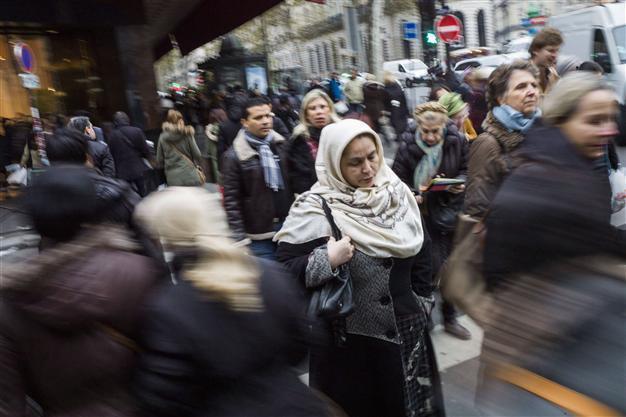French veil ban on trial in new challenge
VERSAILLES, France - Agence France-Presse

A woman wearing a veil crosses the street in central Paris on November 28, 2013. AFP Photo
Lawyers for a young woman whose arrest for wearing a full-face veil sparked riots argued Wednesday in court that France's contentious ban on such coverings was unconstitutional and targeted Muslims.
The court said it would deliver a verdict on January 8 on her lawyer's request for a special procedure to seek a review by the country's Constitutional Council of a law that has already been passed.
The case relates to Cassandra Belin, 20, who was stopped by police in the gritty town of Trappes, west of Paris, on July 18 for wearing the veil in public.
The incident, in the midst of the Muslim fasting month of Ramadan, led to an altercation and her husband Michael Khiri was arrested and accused of insulting a police officer.
He was later found guilty and got a three-month suspended sentence. The incident sparked two nights of rioting in Trappes, which has a large immigrant population.
Belin's lawyer Philippe Bataille told the court in the western suburb of Versailles that the ban on the veil, which came into force in 2011, impinged on freedom of religion and of movement and went against human dignity.
"How can a woman who is entirely veiled be considered a threat to public order?" Bataille said, adding that the law was discriminatory as "it only applies to Muslims." He said one of the policemen had ripped apart Belin's veil and shoved her mother-in-law, who was accompanying the couple.
"The law must not be put in the hands of Islamophobic officers," Bataille added.
France argues that the ban, which was approved by the Constitutional Council in 2010 after three years of intense debate, is necessary for security reasons and to uphold the country's secular traditions.
Critics of the ban say if security is a consideration, then motorcycle helmets should also be outlawed. In theory the ban covers all face coverings but in practice the only arrests have been of women wearing Muslim veils.
Belin's trial for defying the ban and insulting a police officer opened at the end of October but was immediately deferred to Wednesday after her lawyer asked for a review of the law.
The public prosecutor has asked the court to throw out the request on the grounds that the law has already been declared constitutional.
Belin shunned Wednesday's hearing. Her lawyer said she did not want to be wrongly seen as a "symbol of rampant Islamisation." She has admitted telling the police officers to "shut up" but denied saying "Allah will crush you." The police officers claim she also used swear words.
In a parallel case, one of the three officers involved in the incident is being investigated for using Islamophobic language on Facebook and for "inciting hatred and racial discrimination." The officer allegedly posted a message saying, "white women are the best" and mocked veiled women.
The lawyer representing the police officers said some people were using religion as a pretext to attack France's core values.
"Under the guise of a debate undertaken by some people on the freedom of religion, you have people who attack our laws," Thibault de Montbrial told the court.
"Our institutions are being put to the test," he said. "Cassandra Belin was not made to undergo an identity check because she was Muslim but because she had committed an offence." "The Republic must be firm and resist," de Montbrial said. "Otherwise in 10-15 years they will be asking for polygamy and sharia." The Trappes case is not the only legal challenge to France's ban on the full-face veil in public places.
Last month, the Strasbourg-based European Court of Human Rights heard a case brought by a 23-year-old French graduate, identified by her initials SAS, that the law is discriminatory.
She argues that the burqa ban violates her rights to freedom of religion, freedom of expression, freedom of assembly and a prohibition against discrimination.
